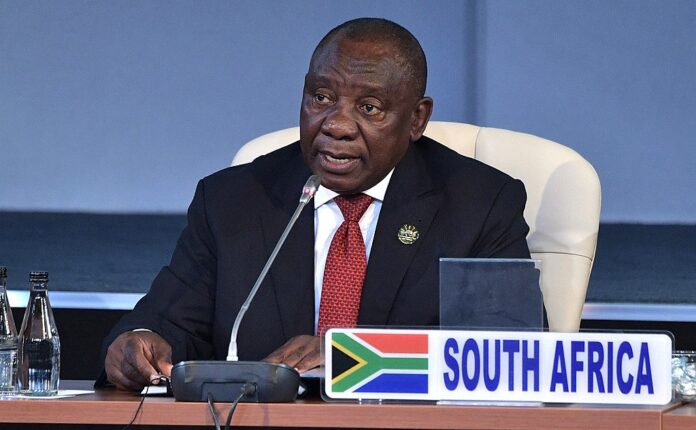South African President Cyril Ramaphosa introduces comprehensive reforms to overhaul public procurement and address state capture issues
South African President Cyril Ramaphosa has taken a significant step towards addressing corruption and reforming public procurement with the recent signing of the Public Procurement Act. This new law, enacted to address the issues highlighted by Chief Justice Raymond Zondo’s state capture commission, aims to overhaul procurement processes and enhance transparency in government spending.
In his weekly newsletter, President Ramaphosa announced that the Public Procurement Act will eliminate the fragmented procurement laws that plagued the system. Chief Justice Zondo’s report had exposed severe corruption in procurement, calling it the “centrepiece of state capture.” To counter this, the Act introduces a cohesive regulatory framework designed to prevent abuses and ensure proper management of public funds.
Embed from Getty ImagesThe Public Procurement Act establishes a dedicated office within the National Treasury to oversee procurement practices. This office will implement measures to promote standardization and leverage technology for modernizing the procurement process. Ramaphosa emphasized that the new law will address issues identified by the commission and support a more effective procurement system.
Key provisions of the Act include:
- Code of Conduct and Training: Procurement officials must adhere to a strict code of conduct and undergo continuous professional development.
- Protection for Whistleblowers: The law prohibits any form of coercion or retaliation against officials who report violations of procurement processes.
- Anti-Interference Measures: The Act outlaws interference in procurement processes and tampering with tender bids.
- Debarment Orders: Suppliers found guilty of fraud or corruption can be barred from participating in procurement processes for a specified period.
- Exclusions for State Employees: The law excludes public office bearers, public servants, and other categories from bidding on state contracts to prevent conflicts of interest.
Ramaphosa highlighted that these reforms are part of broader efforts to restore integrity in public institutions and ensure that public funds are used effectively for national development. By addressing the weaknesses exposed by the state capture commission, the Act aims to build a more transparent and accountable procurement system.
The President’s commitment to fighting corruption and improving procurement practices represents a crucial step towards rebuilding public trust and promoting economic transformation in South Africa.
Analysis
Political
The Public Procurement Act marks a pivotal moment in South Africa’s political landscape, reflecting President Cyril Ramaphosa’s commitment to tackling corruption and improving governance. By enacting this law, Ramaphosa addresses one of the most critical issues identified by the state capture commission, thereby reinforcing his administration’s stance against corruption. The Act could strengthen his political position by demonstrating effective leadership and responsiveness to public and judicial concerns. It also sets a precedent for future reforms and signals a decisive move towards restoring credibility in South African public institutions.
The law’s impact extends to the broader political arena, potentially influencing other African nations grappling with similar issues. Ramaphosa’s proactive stance may encourage other leaders to pursue similar reforms, fostering a regional trend towards greater transparency and accountability. However, the success of these reforms will depend on their implementation and the government’s ability to enforce the new regulations effectively.
Social
Socially, the Public Procurement Act addresses widespread concerns about corruption and inefficiency in public spending. The law’s introduction comes at a time when South Africans are increasingly demanding transparency and accountability from their leaders. By improving procurement practices and protecting whistleblowers, the Act seeks to restore public trust in government institutions. This reform aligns with broader societal expectations for ethical governance and responsible management of public resources.
The law also contributes to social equity by ensuring that public funds are used effectively to support transformation and local development. As the government strengthens procurement processes, it aims to enhance opportunities for businesses and communities that have historically been marginalized, thereby promoting inclusive economic growth.
Racial
The Public Procurement Act indirectly impacts racial equity by addressing systemic corruption that has historically affected marginalized communities. Corruption and mismanagement in procurement processes often disproportionately disadvantage black and other minority-owned businesses. By implementing stricter regulations and improving transparency, the Act seeks to create a more level playing field, reducing barriers for businesses owned by historically disadvantaged groups.
Moreover, the Act’s focus on fair and transparent procurement practices can help ensure that resources are allocated more equitably, supporting development projects and initiatives that benefit diverse communities. While the law itself does not specifically address racial issues, its implementation could contribute to broader efforts to promote racial and economic justice in South Africa.
Gender
The Public Procurement Act’s provisions on ethics and accountability have implications for gender equity in procurement. By enforcing a code of conduct and protecting whistleblowers, the Act helps create a more equitable environment for all procurement officials, including women. This approach addresses concerns about gender-based discrimination and bias in procurement processes.
Additionally, the Act’s emphasis on transparency and professionalism can help support women-owned businesses by ensuring they have equal access to government contracts and opportunities. As the procurement system becomes more transparent, it may also encourage greater participation by women in public sector projects and reduce gender-related disparities in business opportunities.
Economic
Economically, the Public Procurement Act is poised to enhance the efficiency and effectiveness of public spending in South Africa. By addressing procurement corruption and improving transparency, the law aims to optimize the use of public funds, ensuring that resources are allocated to projects that drive economic growth and development. The Act’s emphasis on technology and standardization can lead to more competitive bidding processes, potentially reducing costs and improving value for money in government contracts.
The law also has the potential to stimulate local businesses and support economic transformation by creating a fairer procurement environment. As the government enforces stricter regulations and enhances oversight, businesses that adhere to ethical practices will benefit from increased opportunities, contributing to a more dynamic and inclusive economy.
